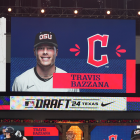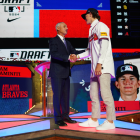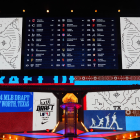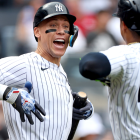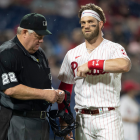On the heels of Tuesday's MLB All-Star Game, the league is once again defending the lack of name-brand appeal from some of sport's biggest stars. And -- again -- they're sort of pushing the blame on the players themselves.
It's the second straight year that MLB has found itself in the situation, and that they've responded the same way both times: by deflecting blame. In 2018, MLB commissioner Rob Manfred essentially claimed that Mike Trout -- a generational player who should probably be one of the world's biggest sports stars -- isn't more popular because he refuses to market himself. It's not the league's fault, according to Manfred.
"Mike has made decisions on what he wants to do, doesn't want to do, how he wants to spend his free time or not spend his free time," Manfred said just before the 2018 All-Star Game at Nationals Park. "I think we could help him make his brand very big. But he has to make a decision to engage. It takes time and effort."
This year, it was more of the same ... just with a different star player attached to the argument.
In a piece from the Boston Globe on Wednesday titled "Mookie Betts is example of baseball's brand-new problem," MLBPA executive director Tony Clark says that Betts "should be a household name."
"Mookie should be a one-name guy," Clark said. "You say [Cristiano] Ronaldo. You say [Lionel] Messi. You say Mookie. You should know who Mookie is. And, outside the baseball world I don't know how many people do. In the grand scheme of things, respected players should be at the forefront of every conversation. He should be in the conversation with non-baseball fans. Mookie [should] be one of them. No doubt about it."
The Globe piece positions that Betts could arguably be the league's most marketable player, considering he's 1) less than a year removed from an MVP season that culminated in a World Series title; 2) plays in a major market for a prestigious team where he's frequently in the playoff picture; and 3) is a four-time All-Star.
Clark believes all of those things should factor into making Mookie a global superstar, and he has a point.
But the league once again has reportedly shifted blame onto the player, claiming that Betts doesn't want to make the effort to be at the forefront of baseball.
One source from the league office heard what Clark had to offer on Betts's lack of promotion and told the Globe that MLB tried to push Betts, but the majority of time Betts has declined.
The source alluded to its "Let The Kids Play" commercial as one of the promotions MLB tried to involve Betts in, yet the outfielder chose not to participate.
Betts himself was asked about his willingness to embrace a higher level of stardom, and his response didn't exactly make it seem like he was frothing at the opportunity.
"I mean I don't know if this is something to necessarily want," Betts said, via the Globe. "It's definitely something cool to have your name mentioned amongst them [Messi and Ronaldo]. There are some guys that definitely deserve it. If I'm one, cool. If I'm not, that's perfectly fine, too."
Maybe it's just him being humble, or maybe he really just doesn't care. Either way, it's not an ideal situation for the league, which continues to seem very reluctant to accept blame despite the fact that they've largely failed at elevating the stardom of most of their other premier players not named Mookie.
At the very least, the league seems to be giving some new ideas a shot.
Throughout Tuesday's All-Star Game, MLB allowed Fox to mic up various players during the action, and not just for quick sound bytes or dugout interviews. Those players joined the broadcast live, which not only gave viewers an interesting look at how they communicated during play but also a glimpse into their personality between pitches.
It produced neat results.
Freddie Freeman might have a future in broadcasting. 😂 pic.twitter.com/siDHZLf4jk
— MLB (@MLB) July 10, 2019
There's calling for a pop up, and then there's this... pic.twitter.com/CINKqo0NlB
— FOX Sports: MLB (@MLBONFOX) July 10, 2019
However, the issue still remains that the exposure of this new marketing tool is limited to fans who are already interested enough to tune into the MLB All-Star Game, so it's unlikely to have an impact on MLB's bigger problem.
Right now, the only thing bigger than that problem might be the unrelenting refusal from anyone, player or otherwise, to take responsibility for it.












